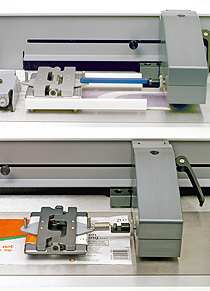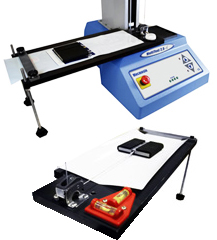 Coefficient of Friction (COF) Testers
Coefficient of Friction (COF) TestersDry friction is the force resisting lateral motion between two solid surfaces in contact. This divides into static friction, the force experienced when there is no relative motion between the two surfaces, and kinetic friction, experienced when the surfaces are moving relative to each other. The commonly used value is the coefficient of friction (COF), which describes the ratio of the frictional force between the surfaces of the two bodies, and the force pressing them together.
Bench testing of COF typically employs a friction table, where a sled of known weight covered in one material is drawn at constant speed along a flat surface of another, or the same, material.
An accurate friction testing system should enable the peak force as the sled starts to move to be captured—the static (starting) friction, or ‘stiction’ effect—and anomalies where the surface judders under dynamic ‘stick-slip’ during the kinetic measurement phase.
Mecmesin offers several solutions to measure the coefficient of friction. The FPT-H1 horizontal systems are dedicated testers suitable for all friction test standards, while the MultiTest-i universal tester can be fitted with accessories to perform some tests based on specific BSI and ASTM standards.

Our touch-screen and computer-controlled FPT-H1 testers are dedicated easy-to-use, affordable and robust systems for optimal coefficient of friction testing.

Our computer-controlled MultiTest-i test system, fitted with the coefficient of friction accessories, enables testing to some international standards. Ideal when tests need not be performed regularly and the standard does not require sled set-down/lift or heated samples.
Related test types: Torque to Turn (rotational friction)